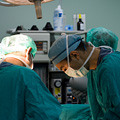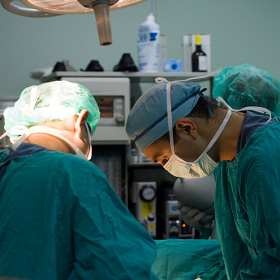
A patient undergoing an appendectomy
The basics Appendectomy is a permanent surgical procedure that removes the appendix (a small sac attached to the large intestine). This procedure is usually performed to treat appendicitis, which is a relatively common condition where the appendix becomes inflamed or infected from blockage or other unknown reasons.
An appendectomy is the only treatment for appendicitis. If it is not removed in time, your appendix might burst, which can lead to serious complications. The procedure is done in a hospital under general anesthetic.
Risks and precautionsIn general, surgery and the use of anesthesia come with some risks that are associated with factors like your health and what the surgery involves. Side effects are very rare but can include trouble breathing, reactions to the anesthetic, bleeding, infection, scarring, and death.
Appendectomy is usually a straightforward and safe procedure. However, there are some risks of complications or side effects, including:
- bleeding
- infection
- intestinal obstruction
- reactions to medications for anesthesia
- scarring
- damage to nearby organs
Get immediate medical assistance if you experience any of these complications or side effects.
It is important that you understand all the risks of complications and side effects of the procedure, and what you or your doctor can do to avoid them. Make sure that your doctor is aware of all your concerns.
Some people may experience complications or side effects other than those listed. Check with your doctor if you notice any symptom that worries you after your procedure.
During the testAn appendectomy is done in a hospital under general anesthetic.
Traditionally, the surgeon will make a 2 to 4 inches long incision on your lower right abdomen, remove the appendix from the large intestine, and then close the hole in the colon and abdomen with sutures. If an infection or abscess is present, the surgeon may drain the infection by placing a tube in the skin first, and then take out the appendix a few weeks later.
Your surgeon may also perform a laproscopic appendectomy, which is a minimally invasive procedure that is performed with several small incisions and a camera. A laparoscopic surgery may leave less scarring and allow you to recover faster. This procedure is not suitable for people who have an abscess or whose appendix has burst.
Both methods take about 1 to 2 hours to complete.
During the surgery, your surgeon may find that the appendix is not the cause of the problem. In that case, the appendix will still most likely be removed to prevent future problems.
Before the testIt is important that you fully understand what the procedure involves beforehand. Ask your doctor to explain the risks, benefits, and drawbacks of the procedure, and don't be shy to probe further until you are comfortable with your doctor's responses.
Before the procedure, your doctor will conduct a number of tests to rule out other possible causes of your symptoms. These may include a medical history, physical examination, blood test, urine test, CT (computed tomography) scan, and ultrasound. You may be given intravenous (IV) fluids and antibiotics before surgery.
You may not be able to eat or drink before the procedure; follow the timing that your doctor recommended, otherwise you run the risk of the surgery being cancelled or postponed. In general, people are advised to not eat for 8 hours before the procedure; and most hospitals ask that you do not drink or eat anything after midnight the night before the procedure.
If you are taking any prescription or over-the-counter (non-prescription) medications, supplements, or herbal products, make sure you inform your doctor or pharmacist. Ask them whether it is necessary for you to stop taking any of these medications and products before the procedure. It is also important to tell them if you have allergies to certain medications, bandages, latex, or have other medical conditions.
Plan to have someone drive you home after the procedure.
After the testBecause an appendectomy is done using general anesthesia, you will be assigned to a hospital recovery room immediately after the surgery. As the anesthesia wears off, you may feel sore, groggy, or nauseous. Nurses will be available to assist you.
After the anesthetic wears off, you will either be discharged from the hospital or required to stay overnight, at which point you will be moved to a regular ward for the rest of your stay. Before you are discharged, the doctor or nurse will explain the steps you need to take to complete your recovery at home.
Your doctor may give you pain-relieving medications if you experience discomfort after surgery. If you had a burst appendix, you may be given antibiotics post-surgery as well.
Most people stay 1 to 3 days in the hospital after the surgery, but you may stay longer if you had a burst appendix or experienced complications during surgery. You should be able to resume normal daily activities after 1 to 3 weeks. Recovery from a traditional appendectomy takes about 4 to 6 weeks, and it takes about 1 to 2 weeks for a laparoscopic appendectomy.
You should contact your doctor if you experience persistent pain, fever, smelly discharge at your surgical site, or changes in bowel movements.

A patient undergoing an appendectomy